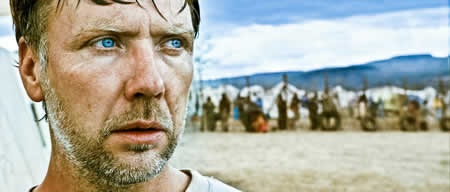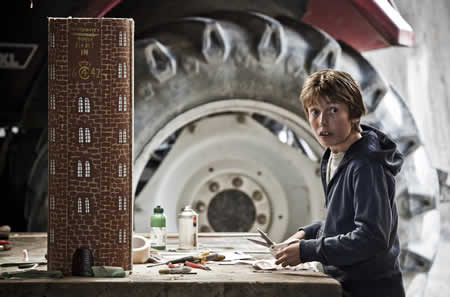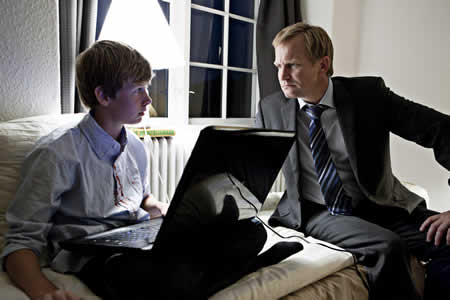 In a Better World, a 2011 OSCAR nominee for the Best Foreign Language Film Award, is story of Anton (Mikael Persbrandt) a doctor who commutes between his home in an idyllic town in Denmark and his work at an African refugee camp. In these two very different worlds, he and his family are faced with conflicts that lead them to difficult choices between revenge and forgiveness. Anton and his wife Marianne (Trine Dyrholm), who have two young sons, are separated and struggling with the possibility of divorce. Their older, twelve-year-old son Elias (Markus Rygaard) is being bullied at school, until he is defended by Christian (William Jøhnk Nielsen), a new boy who has just moved from London with his father, Claus (Ulrich Thomsen). Christian’s mother recently lost her battle with cancer, and Christian is greatly troubled by her death.
In a Better World, a 2011 OSCAR nominee for the Best Foreign Language Film Award, is story of Anton (Mikael Persbrandt) a doctor who commutes between his home in an idyllic town in Denmark and his work at an African refugee camp. In these two very different worlds, he and his family are faced with conflicts that lead them to difficult choices between revenge and forgiveness. Anton and his wife Marianne (Trine Dyrholm), who have two young sons, are separated and struggling with the possibility of divorce. Their older, twelve-year-old son Elias (Markus Rygaard) is being bullied at school, until he is defended by Christian (William Jøhnk Nielsen), a new boy who has just moved from London with his father, Claus (Ulrich Thomsen). Christian’s mother recently lost her battle with cancer, and Christian is greatly troubled by her death.
Elias and Christian quickly form a strong bond, but when Christian involves Elias in a dangerous act of revenge with potentially tragic consequences, their friendship is tested and lives are put in danger. Ultimately, it is their parents who are left to help them come to terms with the complexity of human emotions, pain and empathy.
The following is CWB’s Editor In Chief, Bijan Tehrani conversation with Susanne Bier, director of In a Better World.
Biian Tehrani: How did you come up with the idea of making In a Better World? Your film shows that violence in our world today, is not just coming from certain countries or fanatics of a religion, but if we look carefully, we find it in people among us.
Susanne Bier: It was actually a combination of various things, one of them was the screenwriter Mr. Jensen had written some scenes that weren’t actually a part of the story; they were scenes where some boys had been interrogated by the police. We also discussed the way the we perceive the threat as always coming from the outside; and we asked ourselves weather the reality is that the threat can come from within and we wondered, if so, what shape would it have? We looked at the whole nature of violence. What encouraged me to make the film was a combination of some thematic issues and some concrete scenes that screenwriter had written and I liked them, but didn’t actually include them but they are still reminiscent of those scenes in the film.
BT: An amazing aspect of In a Better World is that it deals with several characters at the same time, how did you manage to balance all of these characters in this film? SB: I think we had an organic story where many characters were part of moving the story forward. The thing that is difficult with many characters in a story is that you only have one or two characters that are actually a part of the dramatic development. In this particular film, everybody is a part of the dramatic development, and therefore we had a lot of material to use and when we edited it, we had to take out a lot of that material. It was almost like maintaining a sense of clarity and a sense of focus through all of these engaging stories.
SB: I think we had an organic story where many characters were part of moving the story forward. The thing that is difficult with many characters in a story is that you only have one or two characters that are actually a part of the dramatic development. In this particular film, everybody is a part of the dramatic development, and therefore we had a lot of material to use and when we edited it, we had to take out a lot of that material. It was almost like maintaining a sense of clarity and a sense of focus through all of these engaging stories.
BT: How did you go about casting In a Better World?
SB: I think for me, casting is the key to making a good film. My main interest is on characters; from the beginning of working with the script I am totally engaged character development. Therefore, for me casting is the most important part of my filmmaking and I spend quite a lot of time on casting my films. For instance, I picked Mikael Persbrandt to play the doctor, his part was not written for a Swedish actor but in the movie he speaks Swedish not Danish. In the beginning it seems that the doctor’s part might need someone who is softer than Mikael, Mikael has done a lot of detective movies and he is always seen as being very tough and wild, but the Doctor’s part was written for a mild and sensitive type of character. I though it was very humanely correct to have an actor like Mikael to play the doctor because it gives the character a very different dynamic quality and makes the character much sexier and exciting. Most of the time, I do casting of the characters in a way that it may be different from what is in the script.
BT: How did you come up with the visual style of the film?
SB: Because one of the themes of the movie has to do with the fragility of an idealistic society, it was extremely important for me that all of the locations look very beautiful. You can see that the physical land in the story in Denmark and also in Africa is part of storytelling. Because nature is a part of the story, choice of style was not a stylistic choice, but an organic choice in terms of expressing the content.
BT: There were two different locations that were so opposite with Africa and Denmark, was it difficult to bridge the comparisons between the two locations?
SB: Because I work from inside out, I work from the content and then the landscape. You could say that the movie, on one hand, shows two societies with two very different standards of living and, on the other hand, you could say that the film shows human nature is pretty much the same regardless where you are. We wanted to show that the two landscapes are very different but also very beautiful in their own rights. It’s almost like a natural extension of the script, the characters in the script, and the events that are taking place.
BT: Most films like In a better World end in despair, but your film has a very hopeful ending. Can you explain why you chose to end the film this way? SB: I think if you want to speak to an audience and you feel that you have an important topic, you cannot make them suffocated when they leave the cinema, you have to do it in a way where you address the real important topics, but you also have to infuse your audience with hope. I do believe that there is hope and if you do the right thing then the world is going to be better. The big thing is to do it in the right way; sometimes you have happy endings but you feel that the ending isn’t appropriate, but I think that our ending to this film is very real.
SB: I think if you want to speak to an audience and you feel that you have an important topic, you cannot make them suffocated when they leave the cinema, you have to do it in a way where you address the real important topics, but you also have to infuse your audience with hope. I do believe that there is hope and if you do the right thing then the world is going to be better. The big thing is to do it in the right way; sometimes you have happy endings but you feel that the ending isn’t appropriate, but I think that our ending to this film is very real.
BT: Do you have any future project lined up?
SB: Mr. Jensen and I have actually written a comedy, a romantic comedy, which I think I we will be doing very soon.
BT: How will winning the Oscar help the success of In a Better World?
SB: Winning would be great for the film because it is the most important prize that any film and filmmaker can receive, so the film would be able to reach a much bigger audience.
BT: Thank you so much for your time and it was a great pleasure speaking with you!

